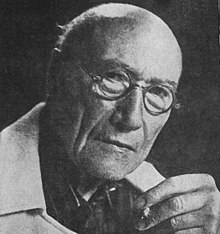Retour de L'U.R.S.S.
| André Gide | |
|---|---|
 |
|
| Born | André Paul Guillaume Gide 22 November 1869 Paris, France |
| Died | 19 February 1951 (aged 81) Paris, France |
| Resting place | Cimetière de Cuverville, Cuverville, Departement du Calvados, Basse-Normandie, France |
| Occupation | Novelist, essayist, dramatist |
| Education | Lycée Henri-IV |
| Notable works |
L'immoraliste (The Immoralist) La porte étroite (Strait Is the Gate) Les caves du Vatican (The Vatican Cellars) La Symphonie Pastorale (The Pastoral Symphony) Les faux-monnayeurs (The Counterfeiters) |
| Notable awards |
Nobel Prize in Literature 1947 |
| Spouse | Madeleine Rondeaux Gide |
| Children | Catherine Gide |
|
|
|
| Signature |  |
André Paul Guillaume Gide (French: [ɑ̃dʁe pɔl ɡijom ʒid]; 22 November 1869 – 19 February 1951) was a French author and winner of the Nobel Prize in Literature in 1947 "for his comprehensive and artistically significant writings, in which human problems and conditions have been presented with a fearless love of truth and keen psychological insight". Gide's career ranged from its beginnings in the symbolist movement, to the advent of anticolonialism between the two World Wars.
Known for his fiction as well as his autobiographical works, Gide exposes to public view the conflict and eventual reconciliation of the two sides of his personality, split apart by a straitlaced traducing of education and a narrow social moralism. Gide's work can be seen as an investigation of freedom and empowerment in the face of moralistic and puritanical constraints, and centres on his continuous effort to achieve intellectual honesty. His self-exploratory texts reflect his search of how to be fully oneself, even to the point of owning one's sexual nature, without at the same time betraying one's values. His political activity is informed by the same ethos, as indicated by his repudiation of communism after his 1936 voyage to the USSR.
Gide was born in Paris on 22 November 1869, into a middle-class Protestant family. His father was a Paris University professor of law who died in 1880. His uncle was the political economist Charles Gide.
Gide was brought up in isolated conditions in Normandy and became a prolific writer at an early age, publishing his first novel, The Notebooks of André Walter (French: Les Cahiers d'André Walter), in 1891, at the age of twenty-one.
In 1893 and 1894, Gide travelled in Northern Africa, and it was there that he came to accept his attraction to boys.
He befriended Oscar Wilde in Paris, and in 1895 Gide and Wilde met in Algiers. Wilde had the impression that he had introduced Gide to homosexuality, but, in fact, Gide had already discovered this on his own.
...
Wikipedia
